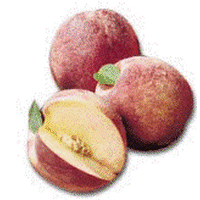Peach

  | Peach in TCM:Explore the properties of Peach according to Chinese
Nutrition and Traditional Chinese Medicine (TCM):
Temperature: neutral
Channels: LI, ST, SI
Flavors: sweet, sour
Tonifies: yin
Special Properties:
circulates qi, circulates blood, disperses cold, resolves dryness
In terms of Traditional Chinese Medicine (TCM) Peach is known for its ability to tonify yin. It also helps to promote qi circulation, lubricate the lungs, regulate blood circulation, and disperse cold.
In general the ancient Chinese medical texts cite that it enters the Stomach, Small Intestine, and Large Intestine. The flavor of Peach is sweet and slightly sour, and it is considered by some sources to be cool in temperature[1][22]. Other sources list peaches as warm in nature, and helpful to expel cold [2]. The editor's choice is to list peaches as neutral, but keep in mind that raw foods are cooler than cooked foods. So the properties of peach cobbler, which has been baked extensively, would be considerably different than the properties of raw peaches. Perhaps this helps to explain the disparity.
Peaches are used for dry cough and other dry conditions of the lungs. They can also help to relieve high blood pressure [1]. Peach leaf tea can help to destroy worms [1]. To promote blood circulation make a tea from the peach kernel, and for dry cough eat peaches [22].
Contraindications: According to some sources, peaches are contraindicated with damp and cold conditions [22]. Other sources say that peaches help to expel cold [2]. The editor's choice is to keep in mind that the properties of raw peaches would be much cooler than cooked peaches, and therefore raw peaches would be less appropriate when cold conditions are present. Since peaches are quite moistening they may be more appropriate for dryness and cold combinations when cooked.
Disclaimer: In accordance with our terms of service, by using this web site you agree that none of the information found on this web site constitutes medical advice. You should always consult your doctor before trying any particular food or herbal remedy to treat disease.
Folk remedies presented on this site are designed to address specifc TCM diagnoses, and are not one-size-fits-all. If you would like to learn more about Traditional Chinese Medicine (TCM) and how it relates to Chinese Nutrition, you can book in a free call with a licensed professional. There is no obligation to purchase.
[CLICK HERE for your free INITIAL CONSULTATION] |

